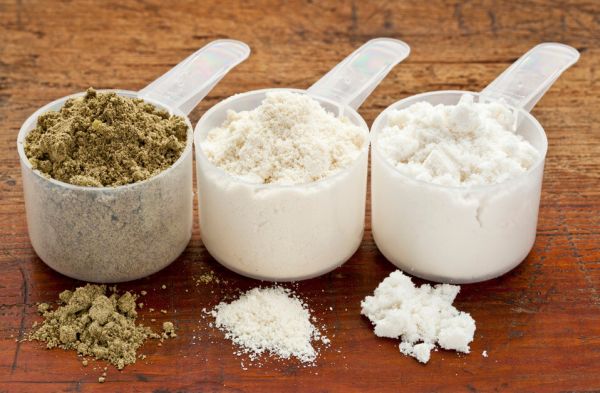In order to get an answer to that question, let’s first take a look at protein itself.
We have two main sources of protein: whole food protein and supplement protein.
Whole food protein is, as you guessed, protein that comes from natural food sources, such as beef, chicken, fish, etc. The best forms of whole food proteins for building muscle are chicken, turkey, lean red meat, fish, eggs, and dairy.
If you’re vegetarian, your best options are eggs, low-fat cottage cheese (Organic Valley is my favorite brand), low-fat European style (Greek) yogurt (0% Fage is my favorite), tempeh, tofu, quinoa, almonds, rice, and beans.
While we’re on the subject of vegetarianism, some people claim that you must carefully combine your proteins if you’re vegetarian or vegan to ensure your body is getting “complete” proteins (all of the amino acids needed to build tissue). This theory and the faulty research it was based on was thoroughly debunked as a myth by the Massachusetts Institute of Technology, yet it still hangs around. While it’s true that some sources of vegetable protein are lower in certain amino acids than other forms of protein, there is no scientific evidence to prove that they lack them altogether.
Protein supplements are powdered or liquid foods that contain protein from various sources, such as whey (a liquid remaining after milk has been curdled and strained in the process of making cheese), egg, and soy (the three most common sources of supplement protein).
You don’t NEED protein supplements to gain muscle, but it can be impractical to try to get all your protein from whole foods every day.
Want to listen to more stuff like this? Check out my podcast!
What You Need to Know About Eating Protein
There are a few things you should know about eating protein.
First is the subject of how much protein you can absorb in one sitting. Studies relating to this are very contradictory and disputed, mainly because it’s a complex subject. Your genetics, metabolism, digestive tract health, lifestyle, and amount of lean mass are all important factors.
But in the spirit of keeping things simple, here’s what we know: you can eat and properly use a lot of protein in each meal.
How much, exactly? Well, your body should have no trouble absorbing upwards of 100 grams in one sitting.
That said, there aren’t any benefits of eating this way (I find gorging quite uncomfortable, actually), but it’s good to know in case you miss a meal and need to make it up by loading protein into a later meal.
Another thing to know about protein is that different proteins digest at different speeds and some are better utilized by the body than others.
Beef protein, for example, is digested quickly and 70-80% of what’s eaten is utilized by the body (the exact number varies based on what study you read, but they all fall between 70 and 80%).
Whey protein is also digested quickly and its “net protein utilization” (NPU) is in the low 90%s, which means that 90-something percent of it can actually be used by your body. Egg protein digests much slower than whey and beef and its NPU also falls in the low 90%s.
As far as non-animal-based options go, pea protein is the real unsung hero of plant proteins. That’s because pea protein is absorbed well (about the same as beef) and, like whey, contains a large amount of leucine.
NPU and digestion speeds are important to know because you want to rely on high-NPU proteins to meet your daily protein requirement, and you want a quick-digesting protein for your post-workout meal and a slow-digesting protein for your final meal before you go to bed.
I could give you charts and tables of the NPU rates of various proteins, but I’m going to just keep it simple. In order to meet your daily protein requirements, here are your choices:
Whole Food Proteins
Lean meats (beef, pork, chicken, and turkey)
Fish
Eggs
Vegetarian sources noted earlier
Protein Supplements
Egg
Whey
Casein
Pea
Vegetarian sources noted earlier
What is the Best Protein Powder for Building Muscle?

So, the best protein powder for building muscle comes down to the four I just listed: whey, casein, egg, and pea.
Now, there are a million different brands of protein and many are marketed and hyped. It can be hard to choose.
Fortunately, I’ve been able to leverage my success as an author to launch my own line of all-natural, filler-free protein powders that are free of chemicals, GMOs, and hormones, which makes the choice much easier.
My favorite whey protein is Legion Whey+, which is a 100% naturally sweetened and flavored whey isolate made from milk sourced from small dairy farms in Ireland, which are known for their exceptionally high-quality dairy.
I can confidently say that this is the creamiest, tastiest, healthiest all-natural whey protein powder you can find.
I also created Casein+, which is a 100% natural micellar casein, which is the highest quality casein you can buy.
Micellar casein is produced in a way that preserves the small bundles of protein (micelles) that are responsible for its slow-digesting properties and often destroyed during traditional manufacturing processes.
This is why Casein+ has a stellar amino acid profile and is the perfect pre-bed protein. It’s also 100% naturally sweetened and flavored, and is the best-tasting all-natural micellar casein out there to boot.
If you’re a vegetarian or vegan, or just want something a little different, I recommend pea protein or pea and rice blend. Their amino acid profiles are complementary and, when combined, look a lot like whey protein.
Specifically, I recommend Plant+, which is a 100% natural plant-based protein powder with 10 additional nutrients that vegan and vegetarian diets in particular tend to lack.
So, if you’re looking for a tasty, high-quality, high-protein pea and rice blend that’s also low in carbs and fats, check out Legion Plant+.
(If you want to know why I don’t recommend soy protein, check out this article on the best protein powders for women).
Between these three different options, I haven’t felt the need to make my own egg protein powder. It’s generally more expensive, and just not as tasty as the other options, so for now I’d recommend Whey+ protein powder, Casein+ protein powder, and Plant+ protein powder.
Which sources of protein do you like most and why? Have anything else to add? Let me know in the comments below!
+ Scientific References
- Young VR, Pellett PL. Plant proteins in relation to human protein and amino acid nutrition. In: American Journal of Clinical Nutrition. Vol 59. American Society for Nutrition; 1994. doi:10.1093/ajcn/59.5.1203S
- Pennings B, Boirie Y, Senden JMG, Gijsen AP, Kuipers H, van Loon LJC. Whey protein stimulates postprandial muscle protein accretion more effectively than do casein and casein hydrolysate in older men. Am J Clin Nutr. 2011;93(5):997-1005. doi:10.3945/ajcn.110.008102
- Res PT, Groen B, Pennings B, et al. Protein ingestion prior to sleep improves post-exercise overnight recovery. Med Sci Sport Exerc. 44(8):1560-1569. https://www.ncbi.nlm.nih.gov/pubmed/22330017. Accessed September 26, 2019.











